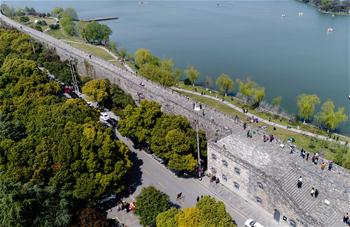by Burak Akinci
ANKARA, March 29 (Xinhua) -- Turkish President Recep Tayyip Erdogan said that relations with the European Union (EU) will be reviewed after a constitutional referendum which would endow him with new extended powers.
He has said it before but does he mean business this time? Local experts think that is not impossible.
His irate remarks after his ministers were banned from campaigning for the massive Turkish diaspora in Germany and the Netherlands for security concerns reflect a sharp shift in the country's traditionally western diplomacy and close relationship with European nations.
With an outpour of daily statements ahead of the crucial referendum on April 16, Erdogan appears bent on taking on the 28-nation bloc which has kept his country waiting at its gate for decades now.
"If a 'yes' follows the April 16 referendum, they would not accept us into the European Union? If they decided that, they would make our decision much easier," President Erdogan said during a weekend rally.
"We will put this EU-Turkey business on the table because Turkey is no one's whipping boy," he said, suggesting that Ankara could reconsider its relationship with Brussels, saying frankly that a second referendum maybe in the works to let Turks decide if they want to continue the unending accession talks.
The review would also include a landmark refugee deal inked in 2015 but economic and trade ties will not change.
The migrant struck between Ankara and Brussels involves returning refugees who crossed the Mediterranean into Turkey, in exchange for 3 billion Euro and promises to speed up Turkey's bid to join the bloc.
"A collapse may be imminent. The proposed constitutional changes may end negotiations between Turkey and the EU," professor Cengiz Altar, senior scholar at Istanbul's political studies center, told Xinhua.
"Negotiations with the EU are actually stalled because of Austria's opposition on opening new chapters and the negative climate in both camps for Turkey's bid," the scholar argued.
The atmosphere and the narrative was quite different when Erdogan's Justice and Development party (AKP) first came to power in 2002 and the subsequent years.
EU leaders praised the Turkish leader back then for the major reforms that he undertook to develop his country's democratic image, particularly the increased rights given to the Kurdish minority.
But the situation soured considerably after a failed coup in July 2016 and the massive purge which lasted afterwards against followers of US-based cleric Fethulah Gulen which the Turkish government blames of masterminding the bloody attempt.
Erdogan then became increasingly anti-western and suspicious.
The EU criticized the referendum, saying it would give the president excessive powers.
Many European countries said they won't extradite suspected Gulen followers and seemed far from convinced of Ankara's harsh measures against any form of opposition throughout the country.
At present Ankara's relations with its NATO ally, the United States, is uncertain due to differences over Fethullah Gulen's extradition and Syrian Kurdish rebels, whom Turkey considers a terrorist group, and its role in fighting the Islamic State (IS).
The Turkish government argues it has been betrayed by the EU since it first knocked on its door in 1963 and also after the launch of accession negotiations in 2005, and that Europe never entertained the thought of embracing Turkey as a full partner.
Also, a mostly Christian union does not favor a Muslim member. Nevertheless, the EU is one of Turkey's major trade partners.
Nearly half of Turkey's exports go to Europe, while 65 percent of direct investments benefiting Turkey originate from EU nations.
Last week, the EU enlargement Commissioner Johannes Hahn said the prospect of Turkey becoming an EU member seems increasingly unrealistic.
Can Acun, a researcher at Ankara's Foundation for Political, Economic and Social Research (SETA) thinks that President Erdogan's inflammatory and nationalistic rhetoric is due to the public opinion's frustration and deception regarding a long awaited EU membership.
"Support for Turkey's membership currently is at a historic low owing to the union's hesitation and practices against the pacta sunt servenda," as well as unfulfilled obligations and a breaching a pact reached by various parties.
"My personal view is that the perspective of a common future with the EU is no longer there. It would be better if both parties engaged in a special partnership rather than a membership," said Acun.
Experts are convinced that the bad terms with Europe will remain regardless of the referendum's outcome.
However, not everyone believes that relations are in real jeopardy, insisting that both parties need each other to develop and confront new challenges.
One of them is leading Turkish international politics expert Bahadir Kaleagasi, president of the Bosphorus Institute.
"EU-Turkish relations involve historical depth, a contemporary partnership and future gains. Short-term sporadic disagreements should not forestall the relationship's strategic configuration," he told Xinhua.
According to Kaleagasi, "Both sides have sufficient historical experience, responsibility and vision to avoid falling into a defeated trap."
"A Turkey progressing towards an EU accession, and one which maintains high standards and the rule of law as well as exhibits Eurasian dynamism will develop quickly in the 21st century."












